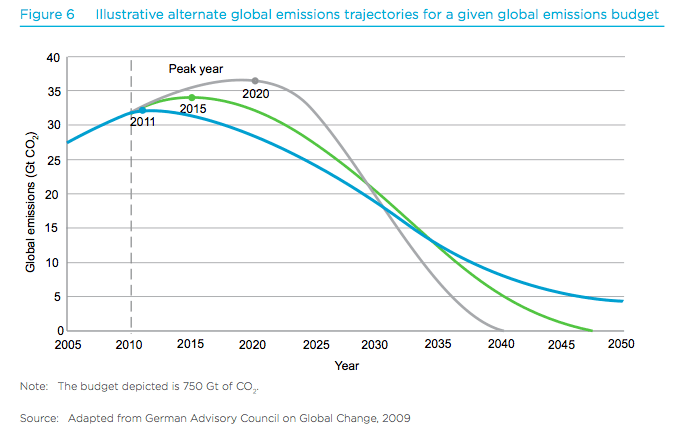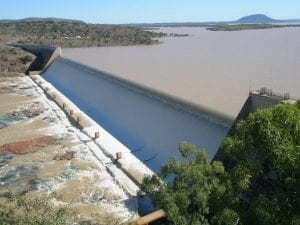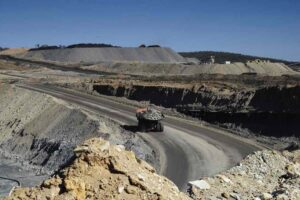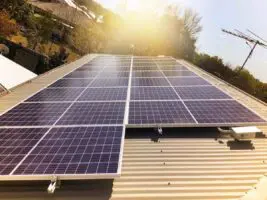The Climate Change Authority has begun a 10-month study into Australia’s greenhouse emissions targets, a review that is likely to recommend a national “carbon budget” for the very first time, and could possibly suggest much steeper and longer-term emission reduction trajectories than has been contemplated by either mainstream political party to date.
The CCA, on Tuesday, released an issues paper on Australia’s targets to reduce greenhouse gas emissions, before it takes submissions and prepares an interim report in October, just a month after the next federal election. It is expected to deliver its final report in February, 2014, presuming it has not already been disbanded by a Coalition government, as has been threatened.
Its chief task is to report on Australia’s progress in meeting greenhouse emissions targets to date, and what its “caps and targets” should be in the future. The extra dimension that is being added into this review is the concept of a “carbon budget” – how this fits in with global action and a global budget to meet what scientists agree should be the minimum target, and how this impacts on the pace of action that should be taken.
“We need to look at the science. We can’t go emitting forever and expect to avoid a dangerous risk of climate change,” Anthea Harris, the CEO of the authority told RenewEconomy in an interview today.
“I think it’s time to refocus on what we are all here for. There has been more heat than light in the discussions on what policy instruments to use.”
The significance of having a carbon budget should not be underestimated. International studies, such as those by the International Energy Agency, say the global budget (and by inference national budgets) could be rapidly exhausted unless the scale of action is increased. They generally agree that to meet the science, between two-thirds and four-fifths of the world’s fossil fuel reserves will need to be left in the ground.
Those budgets can vary depending on whether the world is aiming for a 50 per cent chance or an 80 per cent chance of avoiding dangerous climate change. Or even if it revises its target to 1.5°C. And the trajectories will be influenced by the pace, or lack of it, of action that is taken in the coming years, as this graph provided by the CCA below indicates. It is based around a global budget of 750 megatonnes out to 2050. The world is unlikely to hit a peak at 2015. At best, it could achieve that before 2020, but the budget requires that action from there is more dramatic.
For a fossil fuel-rich country such as Australia, that has major implications – for the government, its fiscal budgets, for the mining industry, and for investors.
The Carbon Tracker Initiative last week updated its analysis on its impact on financial markets, noting that $6 trillion of planned investments out to 2020 could be at risk, and leading banks such as HSBC and Citigroup are also beginning to factor it into their modelling.
A new report by Citi released on Tuesday notes that funds managers are coming under increasing pressure to consider the impact of carbon budgets on their portfolios, and to act accordingly.
“Anti-fossil fuel campaigns targeting investors are accelerating,” Citi analyst Elaine Prior notes in the report. “We suspect that these campaigns will put pressure on fund managers to more explicitly formulate and discuss their approach to fossil fuel investments.”
As Harris suggests, the effect of the CCA review will be to bring this debate into the political arena. Australia currently has bipartisan support for an unconditional 5 per cent reduction from 1990 levels by 2020, and up to 25 per cent depending on what the rest of the world does. It has a 2050 target of an 80 per cent reduction.
So far, though, there has been no talk of carbon budgets at the political level. Erwin Jackson, the deputy CEO of The Climate Institute, says that is one of the most important aspects of the CCA study. “The important thing is that we are now having a debate around what the longer-term trajectory is. Climate change action does not end at 2020.”
The Climate Institute earlier this month made its first attempt at defining a carbon budget for Australia, saying that it could be exhausted within 15 years under some scenarios. A lot depends on the pace of action in coming years, and how Australia’s contribution to a global budget is defined.
As the TCI report noted, and the CCA issues paper notes, there appear to be myriad ways that can be done, including using per capita emissions, historical output, GDP and ability to pay, the profile of the economies, and what like-for like countries – be they defined as trade competitors, on standing of living, or resources – are doing. The CCA defines these issues as capability, responsibility, equality, and access to sustainable development.
Whichever way, Jackson says that the electricity sector is in for massive change. “Australia should be decarbonising its energy sector in the next few decades. That is what the policy framework should be set up to do,” Jackson said.
The CCA will also define caps for the emissions trading scheme out to 2020, and possibly beyond – presuming that the ETS survives a change in government. This is similar to the UK equivalent, which actually enjoys bipartisan support.
The Coalition has promised not just to repeal the carbon price, but also disband the CCA, the Clean Energy Finance Corp, and other bodies – presumably because they are likely to deliver advice they don’t want to hear, or push for investments they don’t want to make. The ability of these bodies to survive will depend on the make-up of the Senate after the election, and/or whether what’s left of the Labor Party seeks to protect the policies it has introduced?
Is Harris confident that her 25-strong team will still be intact to deliver the final report? “Anything is possible in climate change policy,” she said today. “We are a creature of a statute, it is up to parliament to decide whether we continue or not.”










